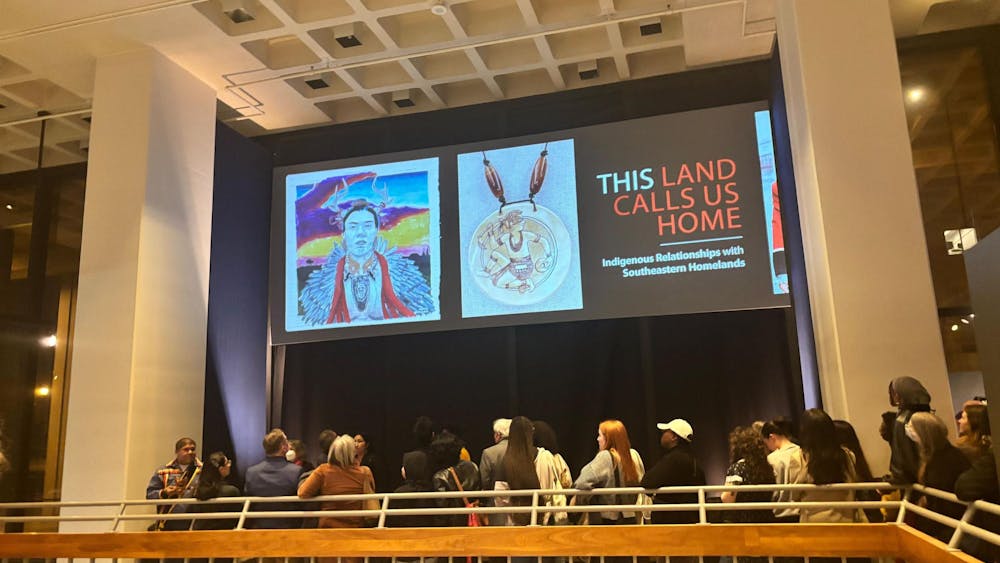Last week, Emory observed National Relationship Violence Awareness Month (RVAM) by holding a series of events and workshops aimed towards educating the community and promoting awareness. RVAM, conceived in the 1980s by the National Coalition Against Domestic Violence (NCADV), aims to connect advocates across the country to work together towards ending violence against women.
These public measures sought to create a dialogue about the various forms in which domestic violence can take place, according to Emory News Center. More than a dozen organizations have gathered to create workshops aimed towards teaching violence prevention strategies, how to provide support for survivors and the power of bystander proactivity.
Emory’s Domestic Violence Awareness Week was initiated with an art installation, the Emory Clothesline Project. Customized t-shirts bearing messages and illustrations pertaining to direct or indirect experiences with violence were strung up at the Dobbs University Center (DUC) terrace. The t-shirts were created by community members directly or indirectly implicated in sexual or domestic violence, with the goal of empowering survivors and encouraging them to break their silence.
Different workshops and discussions like Sexual Assault Peer Advocates (SAPA) 101 training were held on Tuesday to educate volunteers about myths and facts about sexual assault, misconduct policies and survivor response.
Active Bystander Strategies Training was held Wednesday, with the aim of teaching participants about how to assess situations of violence and intervene effectively.
The week concluded with the interactive workshop “Dating Violence at the Intersection of Race, Gender and Sexuality.” The event was hosted by Ulester Douglass, executive director of Men Stopping Violence, and Lee Giordano, the organization’s director of training.
The organization is a training institute that provides communities with the necessary tools to encourage men to take a larger role in ending all forms of violence, according to the organization’s website.
The events were organized as follow-ups to the crowning event of Domestic Violence Awareness Week, Emory’s Take Back the Night (TBTN) speak out rally.
TBNT, which celebrated its 10-year anniversary this year, is hosted by the student-led Alliance for Sexual Assault Prevention (ASAP). The event seeks to support survivors of relationship and sexual violence and give a voice to witnesses and bystanders, according to the event’s flyer.
“Taking back the night is taking back a time, a time that you’re afraid of or has a bad connotation for survivors of sexual assault. By sharing stories, you’re fighting being silenced,” College senior and SAPA co-president Amina Khan said.
Survivors of violence within the Emory community submit anonymous accounts of their stories in the upcoming weeks before TBTN, which are read by volunteers to the attendees during the rally.
“The two pillars of empowerment and awareness embody this event. It’s an opportunity for survivors to feel encouraged to share their stories in a way that feels less daunting by having other community members support them by reading their stories,” College senior and SAPA co-president Rebecca Woofter said.
Due to the delicacy and sensitivity surrounding the topic of the event, great care went into planning the rally.
A committee composed of SAPA co-presidents, ASAP president Kate Faulk, staff members and members of the Emory Panhellenic Council was formed to plan the event, according to Woofter.
The committee met throughout the semester to discuss the different pieces of the event, the logistics behind them, advertising and executing plans in accordance with the support they wanted to provide to survivors.
The event had a strong turnout, with the Winship Ballroom being entirely filled, but getting people there was more complicated than it would seem.
“Reaching out to people is always kind of difficult. You don’t want anyone to feel pressured into giving their story but you also want to have a diverse range of stories of sexual violence,” Khan said.
Despite the fact that these stories can portray college campuses as grounds that harbor terrible forms of violence, it is more revelatory of the efforts Emory is investing in putting an end to these aggressions, College senior and event attendee Jaclyn Tayabji said.
“Emory is doing a great job of encouraging survivors to come forward […]. More survivors are coming forward and a lot of people think that’s a negative sign, but in reality, it’s showing that Emory is fostering a more a welcoming environment for this kind of discussion,” Tayabji said.
For College sophomore John Moore, the event prophesied a better Greek life for Emory.
“[Emory] is doing a lot of proactive things in Greek life to stop fraternities from being synonymous with sexual assault,” Moore said.
The event was considered a big success, but it represents a very small step towards a larger goal we as students and members of contemporary society must seek, according to Khan.
“Changing culture is a slow process,” Khan said. “It’s not something that can just go like ‘Ok, once we change this, we will change all of our culture.’ It’s more by raising awareness, by continuously empowering survivors, [that] we’re changing culture.”
Read More
Trending









